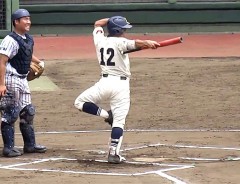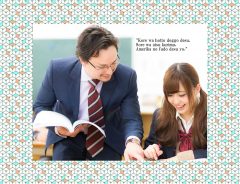
Source: amadank / PIXTA(ピクスタ)
The Japanese Student Formerly Known as Prince Who Fought Back Against Kira Kira Names
- Source:
- akaike_hardtype
- Tags:
- High school / Japanese language / Names / Social Issues
Related Article
-

‘Japanese Week’ sees The Great British Bake Off labelled as racist by viewers
-

This High School Baseball Player Does Moves Like Martial Arts In The Box… It’s A Must-See!
-

Wasei Eigo: Japan’s Pseudo-English
-

30-Story-Tall Giant Panda Attacks Japanese Countryside
-

“Blackboard Movie” produced by current high school students. Kokusen – Blackboard War –
-

Japanese hubby’s hilarious language mistake in note to wife goes viral


We’re used to hearing about the eccentric names that celebrities in the Western world give their children. Apple or Pixie or Zowie to name a few famous examples. But average people get in on the act too, making names a bit more special or individualistic, swapping out an ‘i’ for a ‘y’ and so on.
Japan has their own version of this phenomenon, ‘kira kira’ names. Kira kira is an onomatopoeic word meaning sparkling or shining. The practice is controversial and depending on your viewpoint, the ‘kira kira’ could refer to the creative and original features of the names, or it may be intended to sarcastically deride the fickle parents who would saddle their poor kids with such embarrassing names.
There are many different types of kira kira names. Some are simply unusual or non-traditional. Others are pronounced using readings that don’t actually exist for those kanji (Chinese characters), opting instead for an implied meaning or an English translation. The idea was used in the famous anime and manga 'Death Note', the main character’s name being the English word ‘Light’ but expressed using the kanji for moon (月).
Another interesting example is '愛莉', although the first character, meaning love, is usually read as ‘ai’ in Japanese, in this case it is read out as the English word, ‘love’ (or ‘rabu’ in Japanese pronunciation). The second character is said as it usually is in Japanese names, as ‘ri’. Combined, the characters create the name ‘Raburi’, as in ‘Lovely’.
Source: makaron* / PIXTA(ピクスタ)
Quite complicated, right? Even to a native Japanese person it wouldn’t be clear when looking at the characters, exactly what this person’s name is.
But as defenders of the kira kira names point out, it’s a conversation starter to have to ask how to pronounce someone’s name, and after that the person will forever be memorable.
It’s one thing to have to go through the labour of explaining your name every single time, but what if the name is such a source of embarrassment that the other children laugh at it?
Well some of the kira kira kids have grown up now and are fighting back against their hated names.
Recently there was a story in Japanese media about a high school student who did just that. His name fell into the ‘unusual’ and ‘non-traditonal’ category rather than one of the unreadable, English inspired ones. His parented named him ‘Ouji-sama’ meaning prince.
Although as a name Prince may not be that bad, the main issue was probably the use of the respectful suffix ‘sama’. This is added to the end of names or titles to show extreme respect, and in polite Japanese society, no one would attach this to their own name unless they were making a joke. Introducing himself may have been awkward, and it also might have been strange to hear elders such as his teachers using this suffix. He said when meeting people for the first time, they often laughed at his name.
Not to mention that in customer service situations such as at the bank, when the staff call out a customer's name they are obliged to add the 'sama' suffix anyway, resulting in 'Ouji-sama-sama'?
Believing his name to be a hindrance, the high school student applied to get it legally changed and leave his embarrassing past behind forever.
He was successful and in celebration he posted the confirmation letter on Twitter. He changed his name from ‘Ouji-sama’ to ‘Hajime’, a decidedly normal Japanese name, but with a special meaning. The reading can also mean ‘beginning’, to commemorate the start of his new life with a nice, boring name.
As well as generally celebrating, Hajime was also using the occasion to give hope to other young people in the same situation. From fifteen years old you can submit a request without your parents being involved. Although it’s still subject to judgement by the relevant authorities, Hajime believes he has set a precedent and encourages others to try too.
And now Hajime, the student formerly known as Prince, can proudly introduce himself without worries.